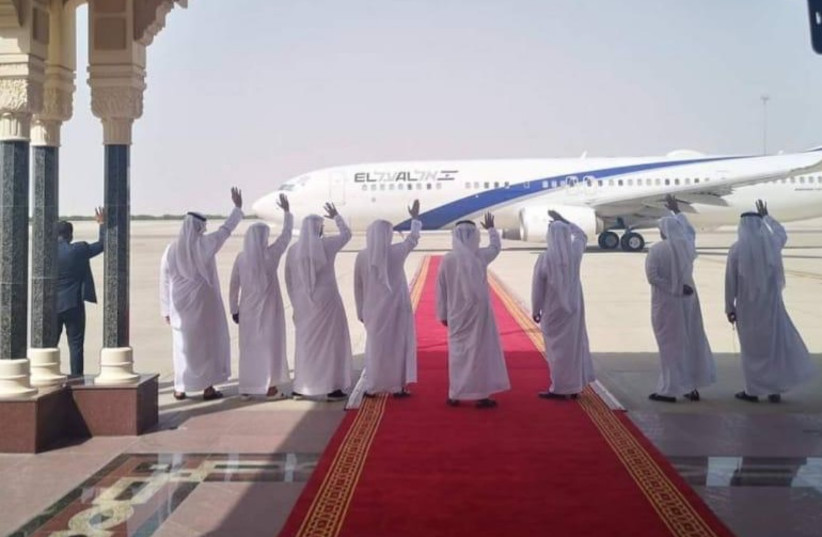Despite the importance placed on resolving the conflict, a majority of Arab respondents thought that some Arab states were still likely to establish ties with Israel without the conflict ending.
Nearly 80% of Saudis are in favor of working towards normalizing ties with Israel within the next five years, with 71% even thinking it likely that other Arab states will normalize ties without a peace deal between Israel and the Palestinians, according to a new poll from Zogby Research Services.
The study surveyed attitudes among Israelis and Arabs from five different countries (Egypt, Saudi Arabia, the United Arab Emirates, Palestine and Jordan) from the period spanning June 24 and July 5. This was over a month before the landmark peace deals between Israel, the UAE and Bahrain were announced, which had resulted in the annexation of 30% of the West Bank, in line with US President Donald Trump’s peace plan, being pulled off the table. As such, annexation remained a real possibility at the time.
What is notable, however, is that the survey still showed that many Arabs were being in favor of normalizing ties with Israel at the time, provided steps were taken to achieve peace with the Palestinians.
Bringing an end to the Israeli-Palestinian conflict was shown to be important for a large majority of both Arab and Israeli respondents (80%) though opinions were divided on how likely a resolution could be achieved within the next five years. As such, it is unsurprising to see that a majority of Arab respondents said normalizing ties with Israel, without there being peace with the Palestinians, was undesirable – with the exception of the UAE where 56% said it was still desirable.
And despite the importance placed on resolving the conflict, a majority of Arab respondents thought that some Arab states were still likely to establish ties with Israel without the conflict ending.
Overall, Arab respondents were more optimistic about how quickly the conflict could be resolved, with the lowest percentages being 53% from Jordan and 57% from “Palestine” and the highest being the UAE with 76%. By comparison, only 15% of Israelis felt the same.
With the exception of Palestinian respondents, 40% from other Arab countries said that Arabs should work to convince Israel of the benefits of resolving the conflict and establish normalized ties with other countries in the region. However, 70% of all Arab respondents did insist that despite the many benefits of normalizing relations with the Jewish state, annexation would mean the end of their support.
cnxps.cmd.push(function () { cnxps({ playerId: ’36af7c51-0caf-4741-9824-2c941fc6c17b’ }).render(‘4c4d856e0e6f4e3d808bbc1715e132f6’); });
THESE STATISTICS were reflected by an opinion piece authored by the Emirati Ambassador to the US in the Israeli newspaper Yediot Aharonot, which warned of the damages of annexation to Israeli-Arab ties while also discussing some of the benefits that could come from warmer relations. The survey found that more Arabs than Israelis were familiar with the article (55% compared to 38%). In addition, while a majority of respondents from Arab states were in favor of the article, a majority of Palestinians were opposed, with Israelis being divided.
But what is arguably most interesting is how the article shifted opinion among some Israeli respondents, with 15% of respondents no longer supporting annexation after reading the article. However, the gap between secular and religious Israelis on the issue remains.
Regarding incentives to normalizing ties with Israel, Arabs were divided on which benefits were the most desirable. The top choice for Emiratis (55%), Saudis (40%) and Jordanians (36%) is “furthering shared interests around climate change, water and food security, technology and advanced science.” The top choice for Egypt (37%) is “mutually beneficial increases in trade and investment in health care and education.”
Iran was also a notable factor, with “Working together to confront regional challenges from extremism to Iran” being desirable to between 21% and 36% of Arab respondents. About one in five say increasing tourism would be worthwhile to explore if Arab states proceed with normalization. Also notable is the Palestinian response, with the survey showing the same support (34%) for both shared climate, water, food and technology interests as well as seeing nothing of interest.
The findings of the survey contrast with a recent poll published by Mitvim – The Israeli Institute for Regional Foreign Policies. According to that study, the fields of tourism, trade and technology were the most important benefits in fostering ties with the UAE, according to nearly half (44%) of respondents. That was followed by security at 24%, political at 16% and civil at 5%.
Most Israelis (67%) also believe they should form similar deals with other Arab nations, most notably with Saudi Arabia. However, among Arab respondents, nearly half (48%) said Israelis should focus on resolving the conflict with the Palestinians, while only 29% were in favor of new ties with Arab states.
Despite the importance of resolving the Israeli-Palestinian conflict, 40% felt the deal with the UAE did not impact the prospects of achieving peace.
Lahav Harkov contributed to this report.
Content retrieved from: https://www.jpost.com/arab-israeli-conflict/nearly-80-percent-of-saudis-in-favor-of-normalization-with-israel-poll-645826?fbclid=IwAR2ebz5Smc5gPLfG6Wi-J_nr24mtXZ_4Zo97YSM4kihIM2TC8goDCuNLBCo.
